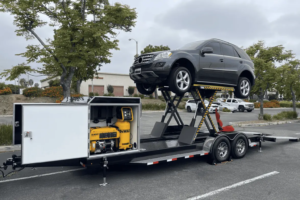Non-QM Lending, also known as Non-Qualified Lending, refers to a type of mortgage that does not conform to the standards set by the Consumer Financial Protection Bureau (CFPB). Unlike traditional loans, these do not meet the Qualified Mortgage (QM) guidelines. This article delves into the intricacies of Non-QM Lending, focusing on how companies like Verus Mortgage Capital (verusmc) play a crucial role in this market.
Understanding Non-QM Mortgages
Non-QM Mortgages are designed for borrowers who may not meet the stringent requirements of traditional mortgage products. These mortgages are particularly beneficial for individuals with unique financial situations, such as self-employed individuals, investors, and those with irregular income streams.
Benefits of Non-QM Lending
One of the significant benefits of Non-QM Lending is the flexibility it offers to borrowers. Traditional loans often have rigid criteria that many potential homeowners cannot meet. Non-QM loans provide an alternative, opening doors for a wider range of individuals to secure home financing.
The Role of Verusmc in Non-QM Lending
Verus Mortgage Capital (verusmc) is a prominent player in the Non-QM market. The company specializes in providing Non-Qualified Mortgages that cater to the needs of non-traditional borrowers. Their expertise and tailored approach make them a go-to choice for many looking for flexible mortgage solutions.
Who Can Benefit from Non-QM Mortgages?
Non-QM Mortgages are ideal for a diverse group of borrowers, including self-employed individuals, small business owners, and those with less-than-perfect credit histories. These loans cater to those who might find it challenging to qualify for traditional mortgages due to their unique financial situations.
Features of Non-QM Mortgages
Non-Qualified Mortgages often come with features that are not available in traditional loans. These include interest-only payments, alternative income verification methods, and more flexible debt-to-income ratios. Such features make these mortgages more accessible to a broader range of borrowers.
Non-QM Lending vs. Traditional Mortgages
When comparing Non-QM Lending to traditional mortgages, one of the main differences lies in the qualification criteria. Traditional loans have strict guidelines that exclude many potential borrowers, while Non-QM loans offer more lenient terms, making homeownership more attainable for many.
Why Choose Non-QM Mortgages?
Choosing Non-QM Mortgages can be a strategic decision for those who do not fit the conventional borrower profile. These loans provide an opportunity to secure financing despite non-traditional income sources or credit issues, making them a viable option for many aspiring homeowners.
The Application Process for Non-QM Lending
The application process for Non-QM Lending differs from that of traditional loans. It often involves a more detailed evaluation of the borrower’s overall financial situation, rather than relying solely on standard income and credit metrics. This thorough approach helps in assessing the true repayment capability of the borrower.
Common Misconceptions About Non-QM Mortgages
There are several misconceptions about Non-QM Mortgages. One common myth is that they are only for risky borrowers. In reality, these mortgages are designed for those with unique financial profiles who may not fit into the conventional lending criteria, but still possess the ability to repay their loans.
The Growth of Non-QM Lending Market
The market for Non-QM Lending has seen significant growth over recent years. This is due to the increasing number of borrowers with non-traditional income sources and the demand for more flexible mortgage products. Companies like verusmc are at the forefront of this growth, providing innovative solutions to meet this rising demand.
Regulatory Aspects of Non-QM Lending
Non-QM Lending operates under a different regulatory framework compared to traditional mortgages. While they do not meet the CFPB’s QM standards, they must still comply with various federal and state regulations to ensure they are safe and viable options for borrowers.
Risks Associated with Non-QM Mortgages
While Non-QM Mortgages offer numerous benefits, they also come with certain risks. Borrowers should be aware that these loans often have higher interest rates and fees. It’s crucial to thoroughly understand the terms and conditions before committing to a Non-QM loan.
Interest Rates in Non-QM Lending
Interest rates for Non-QM Lending can be higher than those for traditional mortgages. This is because lenders take on more risk when offering loans to borrowers with non-traditional profiles. However, companies like verusmc strive to provide competitive rates to their clients.
Non-QM Mortgages for Self-Employed Borrowers
Self-employed individuals often face challenges when applying for traditional mortgages due to irregular income. Non-QM Mortgages cater to these borrowers by considering alternative income verification methods, such as bank statements, making it easier for them to qualify for a loan.
Alternative Income Verification in Non-QM Lending
Non-QM Lending often allows for alternative income verification methods. Instead of relying solely on W-2 forms or tax returns, lenders may consider bank statements, profit and loss statements, or other documentation to assess a borrower’s ability to repay the loan.
Non-QM Mortgages for Investors
Investors looking to expand their real estate portfolios can benefit from Non-QM Mortgages. These loans often have more flexible terms and allow for higher debt-to-income ratios, making them suitable for individuals investing in multiple properties.
Verusmc’s Role in Educating Borrowers
Verusmc plays a crucial role in educating borrowers about the benefits and intricacies of Non-QM Lending. They provide resources and support to help potential borrowers understand their options and make informed decisions about their mortgage needs.
Future Trends in Non-QM Lending
The future of Non-QM Lending looks promising as the demand for flexible mortgage solutions continues to rise. Innovations in loan products and an increasing number of non-traditional borrowers suggest that the Non-QM market will continue to expand, with companies like verusmc leading the way.
How to Choose the Right Non-QM Mortgage
Choosing the right Non-QM Mortgage involves careful consideration of your financial situation and mortgage needs. It’s important to work with experienced lenders, like verusmc, who can guide you through the process and help you find a loan that fits your unique circumstances.
Challenges in Non-QM Lending
Non-QM Lending comes with its set of challenges. These include higher interest rates, stringent regulatory requirements, and the need for thorough borrower evaluation. However, with the right guidance from experts like verusmc, these challenges can be effectively managed.
Impact of Economic Changes on Non-QM Mortgages
Economic fluctuations can impact the Non-QM market. Changes in interest rates, housing market trends, and regulatory adjustments can influence the availability and terms of Non-QM Mortgages. Staying informed about these changes is crucial for borrowers and lenders alike.
Non-QM Lending and Credit Scores
Credit scores play a different role in Non-QM Lending compared to traditional mortgages. While credit scores are still considered, lenders often focus more on the overall financial health and repayment ability of the borrower, rather than relying solely on credit scores.
Innovations in Non-QM Lending
The Non-QM market is constantly evolving with new products and technologies. Innovations such as automated underwriting and alternative credit scoring models are making Non-QM Lending more efficient and accessible, providing borrowers with better options and streamlined processes.
Non-QM Lending and Non-QM Mortgages offer valuable alternatives for borrowers with unique financial situations. Companies like verusmc are instrumental in providing these flexible mortgage solutions, helping more individuals achieve their homeownership dreams. As the market grows, staying informed and working with knowledgeable lenders will be key to navigating the Non-QM landscape successfully.





